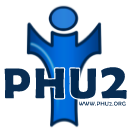Based on the growing socioeconomic trends that are impacting our community, especially during the summer months, food insecurity has been a rising issue that directly affects the well-being of many different families. However, there are numerous and diverse resources available to those who are in need of nutrition services and education. The following programs and services can help fight against food insecurity, while also contributing to long-term health and well-being.
Available Resources:
NJ SNAP:
Board of Social Services Home | Ocean County Government (Income Assistance Programs)
New Jersey’s Supplemental Nutrition Assistance Program (SNAP) provides food assistance to families with generally low incomes to help them buy groceries. This is done through a benefits card that is accepted in most food retail stores and specific farmer’s markets. There are many different factors that may affect eligibility such as income and resources, but qualifying individuals receiving SNAP benefits allow your family to expand its food funds to have nutritious food aiding your family’s overall well-being.
WIC:
WIC Clinics: Women, Infants and Children – Ocean County Health Department
The New Jersey Supplemental Nutrition Program for Women, Infants and Children (WIC) is an ongoing successful public health nutrition program that provides wholesome food, nutrition education, and community support to income eligible participants. Participants receive a benefits card that is accepted in most food retail stores. Food benefits are tailored to encourage healthy options to improve nutrition status and prevent malnutrition. WIC is known to improve health outcomes for nutritionally at-risk women, infants and children up to five years old.
Local Food Pantries:
A food pantry is a distribution center where families receive an opportunity to obtain the food they require no matter the circumstances they face. The food pantry collects food from a wide variety of food banks, which enables a pantry to feed hundreds of individuals and families.
Listed below are three local food pantries:
The Hope Center:
253 Chestnut St.
Toms River, NJ 08753
(732) 341-4447
By Faith Ministries Food Pantry:
322 East 5th Street
Lakewood, NJ 08701
(732) 363-5322
St. Francis Community Center:
4700 Long Beach Blvd
Long Beach Township, NJ 08087
(609) 494-8861
Click the link below to locate a Pantry or Soup Kitchen in Monmouth and Ocean County:
https://fulfillnj.org/get-help/locate-a-pantry-or-soup-kitchen/
Additional Programs:
Ocean County YMCA:
Ocean County YMCA Resumes FREE Summer Meals Program | Ocean County YMCA
The YMCA is taking action in providing lunches and snacks for children Monday through Friday 11am-12pm up until August 26, 2022.
NSLP:
The National School Lunch Program (NSLP) is a federally assisted meal program operating in public and nonprofit private schools as well as residential childcare institutions. It provides nutritionally balanced, low-cost or free lunches to children each school day to prevent hunger and support a healthy lifestyle. To find specific contact information based on your state, please visit: Contact Map | Food and Nutrition Service
State of New Jersey Parent Link:
https://www.nj.gov/njparentlink/ (Health & Wellness – Family Health & Nutrition)

Why mental health has become a crisis
Following the COVID-19 pandemic, rates of anxiety, depression, post-traumatic stress disorder, and substance abuse have risen. Social isolation has led to many mental health symptoms which can last from several months up to three years after the quarantine period (Brookes et al;,2020). While the pandemic will end, some of the lasting effects such as poor mental health may be more of a long term issue. Take the initiative to improve your mental health!
Symptoms of poor post-pandemic mental health:
- Anxiety
- Depression
- Anger/Irritability
- Post-traumatic stress symptoms (flashbacks, severe anxiety, nightmares, uncontrollable thoughts)
- Substance abuse
- Social isolation
- Overly-cautious hand washing
- Avoiding crowded places
- Loneliness
- Domestic violence/child abuse
How to improve your mental health:
- Seek help- Regardless of how severe you perceive your condition to be, it is very important to seek out medical attention any time you experience any struggles with your mental health. Talk therapy may be enough, but in some cases prescribed medication may be needed
- Take care of your body- Daily exercise, proper nutrition, and an adequate amount of sleep will help to keep your body healthy
- Surround yourself with a tribe- People are not meant to be isolated long term. Constant communication with close family and friends can help to boost you up on days you need someone to talk to
- Find healthy coping mechanisms- stress will come and go, however the important determining factor is how you handle it. Find ways to emotionally cope without the use of drugs and alcohol
References:
Brooks S.K., Webster R.K., Smith L.E., Woodland L., Wessely S., Greenberg N., Rubin G.J. The psychological impact of quarantine and how to reduce it: rapid review of the evidence. Lancet. 2020;395:912–920. [PMC free article] [PubMed] [Google Scholar]
What to Do if You Get Sick
- Stay home and call your doctor
- Call your healthcare provider and let them know about your symptoms. Tell them that you have or may have COVID-19. This will help them take care of you and keep other people from getting infected or exposed.
- If you are not sick enough to be hospitalized, you can recover at home. Follow CDC instructions for what to do if you are sick.
- Know when to get emergency help
- Get medical attention immediately if you have any of the emergency warning signs listed above.
Community Support for Older Adults
- Community preparedness planning for COVID-19 should include older adults and people with disabilities, and the organizations that support them in their communities, to ensure their needs are taken into consideration.
- Many of these individuals live in the community, and many depend on services and supports provided in their homes or in the community to maintain their health and independence.
- Long-term care facilities should be vigilant to prevent the introduction and spread of COVID-19. Information for long-term care facilities can be found here.
Family and Caregiver Support
- Know what medications your loved one is taking and see if you can help them have extra on hand.
- Monitor food and other medical supplies (oxygen, incontinence, dialysis, wound care) needed and create a back-up plan.
- Stock up on non-perishable food items to have on hand in your home to minimize trips to stores.
- If you care for a loved one living in a care facility, monitor the situation, ask about the health of the other residents frequently and know the protocol if there is an outbreak.
Pregnant women
Interim Guidance on breastfeeding for a mother confirmed or under investigation for COVID-19
Q: What is the risk to pregnant women of getting COVID-19? If they become infected, will they be more sick than other people?
A: Pregnant women experience changes in their bodies that may increase their risk of becoming very sick from respiratory viruses. With viruses from the same family as COVID-19, and other viral respiratory infections, such as influenza, women have had a higher risk of developing severe illness. It is always important for pregnant women to protect themselves from illnesses.
Q: How can pregnant women protect themselves from getting COVID-19?
Pregnant women should do the same things as the general public to avoid infection. You can help reduce your chances of contracting and slow the spread of COVID-19 by taking these actions:
- Wear a mask
- Social distance (stay 6 feet apart from others)
- Avoid crowds and poorly ventilated indoor spaces
- Avoid people who are sick
- Clean your hands often using soap and water or alcohol-based hand sanitizer
You can find additional information on preventing COVID-19 disease at CDC’s (Prevention for 2019 Novel Coronavirus).
Q: Can COVID-19 cause problems for a pregnancy?
A: Pregnant women with COVID-19 are at a higher risk for preterm birth and may be at higher risk for adverse pregnancy outcomes. Efforts to increase understanding of the impact of COVID-19 on pregnant women and infants is ongoing.
Transmission during pregnancy or during delivery
Q: Can COVID-19 be passed from a pregnant woman to the fetus or newborn?
A: Most newborns of mothers who had COVID-19 during pregnancy are not infected with COVID-19 when they are born. Some newborns have tested positive for the COVID-19 virus shortly after birth, but it is unknown whether they were infected before, during, or after birth. In the majority of these cases, the infants’ symptoms were nonexistent or mild and the newborns recovered.
Call your doctor: If you think you have been exposed to COVID-19 and develop a fever and symptoms, such as cough or difficulty breathing, call your healthcare provider for medical advice.
Steps to help prevent the spread of COVID-19 if you are sick
Follow the steps below: If you are sick with COVID-19 or suspect you are infected with the virus that causes COVID-19, follow the steps below to help prevent the disease from spreading to people in your home and community.
Stay home except to get medical care
- Stay home: People who are mildly ill with COVID-19 are able to isolate at home during their illness. You should restrict activities outside your home, except for getting medical care.
- Avoid public areas: Do not go to work, school, or public areas.
- Avoid public transportation: Avoid using public transportation, ride-sharing, or taxis.
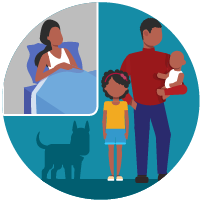
Separate yourself from other people and animals in your home
- Stay away from others: As much as possible, you should stay in a specific room and away from other people in your home. Also, you should use a separate bathroom, if available.
- Limit contact with pets & animals: You should restrict contact with pets and other animals while you are sick with COVID-19, just like you would around other people. Although the risk of pets or other animals becoming sick with COVID-19 is low, it is still recommended that people sick with COVID-19 limit their contact with pets if possible.
- When possible, have another member of your household care for your animals while you are sick. If you are sick with COVID-19, avoid contact with your pet, including petting, snuggling, being kissed or licked, and sharing food. If you must care for your pet or be around animals while you are sick, wash your hands before and after you interact with pets and wear a facemask. See COVID-19 and Animals for more information.
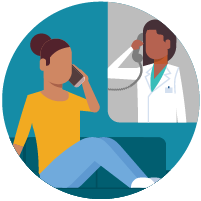
Call ahead before visiting your doctor
- Call ahead: If you have a medical appointment, call the healthcare provider and tell them that you have or may have COVID-19. This will help the healthcare provider’s office take steps to keep other people from getting infected or exposed.
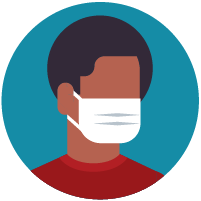
Wear a facemask
- If you are sick: You should wear a facemask when you are around other people (e.g., sharing a room or vehicle) or pets and before you enter a healthcare provider’s office.
- If you are caring for others: If the person who is sick is not able to wear a facemask (for example, because it causes trouble breathing), then people who live with the person who is sick should not stay in the same room with them, or they should wear a facemask if they enter a room with the person who is sick.
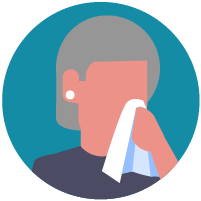
Cover your coughs and sneezes
- Cover: Cover your mouth and nose with a tissue when you cough or sneeze.
- Dispose: Throw used tissues in a lined trash can.
- Wash hands: Immediately wash your hands with soap and water for at least 20 seconds or, if soap and water are not available, clean your hands with an alcohol-based hand sanitizer that contains at least 60% alcohol.
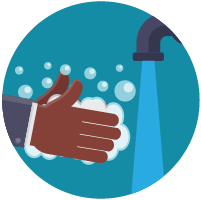
Clean your hands often
- Wash hands: Wash your hands often with soap and water for at least 20 seconds, especially after blowing your nose, coughing, or sneezing; going to the bathroom; and before eating or preparing food.
- Hand sanitizer: If soap and water are not readily available, use an alcohol-based hand sanitizer with at least 60% alcohol, covering all surfaces of your hands and rubbing them together until they feel dry.
- Soap and water: Soap and water are the best option if hands are visibly dirty.
- Avoid touching: Avoid touching your eyes, nose, and mouth with unwashed hands.
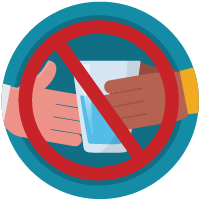
Avoid sharing personal household items
- Do not share: You should not share dishes, drinking glasses, cups, eating utensils, towels, or bedding with other people or pets in your home.
- Wash thoroughly after use: After using these items, they should be washed thoroughly with soap and water.
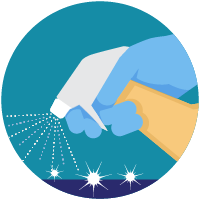
Clean all “high-touch” surfaces everyday
- Clean and disinfect: Practice routine cleaning of high touch surfaces.
High touch surfaces include counters, tabletops, doorknobs, bathroom fixtures, toilets, phones, keyboards, tablets, and bedside tables.
- Disinfect areas with bodily fluids: Also, clean any surfaces that may have blood, stool, or body fluids on them.
- Household cleaners: Use a household cleaning spray or wipe, according to the label instructions. Labels contain instructions for safe and effective use of the cleaning product including precautions you should take when applying the product, such as wearing gloves and making sure you have good ventilation during use of the product.
Complete disinfection guidance
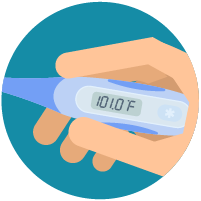
Monitor your symptoms
- Seek medical attention: Seek prompt medical attention if your illness is worsening (e.g., difficulty breathing).
- Call your doctor: Before seeking care, call your healthcare provider and tell them that you have, or are being evaluated for, COVID-19.
- Wear a facemask when sick: Put on a facemask before you enter the facility. These steps will help the healthcare provider’s office to keep other people in the office or waiting room from getting infected or exposed.
Call 911 if you have a medical emergency: If you have a medical emergency and need to call 911, notify the dispatch personnel that you have, or are being evaluated for COVID-19. If possible, put on a facemask before emergency medical services arrive.
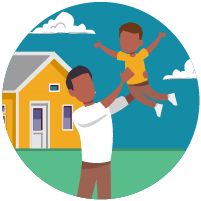
Discontinuing home isolation
- Stay at home until instructed to leave: Patients with confirmed COVID-19 should remain under home isolation precautions until the risk of secondary transmission to others is thought to be low.
- Talk to your healthcare provider: The decision to discontinue home isolation precautions should be made on a case-by-case basis, in consultation with healthcare providers and state and local health departments.
There are currently three options for COVID-19 vaccination under Emergency Use Authorization (EUA) from the FDA. Find out how and where to get vaccinated by checking out the CDC website.
The best way to prevent illness is to avoid being exposed to this virus.
The virus is mainly spread:
- Through respiratory droplets produced when an infected person coughs or sneezes
- Between people who are in close contact with one another (within about 6 feet).
These droplets can land in the mouths or noses of people who are nearby or possibly be inhaled into the lungs.
Older adults and people who have severe underlying chronic medical conditions like heart or lung disease or diabetes seem to be at higher risk for developing more serious complications from COVID-19 illness. Please consult with your health care provider about additional steps you may be able to take to protect yourself.
Take steps to protect yourself
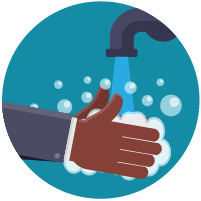
Clean your hands often
- Wash your hands often with soap and water for at least 20 seconds especially after you have been in a public place, or after blowing your nose, coughing, or sneezing.
- If soap and water are not readily available, use a hand sanitizer that contains at least 60% alcohol. Cover all surfaces of your hands and rub them together until they feel dry.
- Avoid touching your eyes, nose, and mouth with unwashed hands.
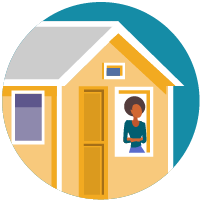
Avoid close contact
- Avoid close contact with people who are sick
- Put distance between yourself and other people if COVID-19 is spreading in your community. This is especially important for people who are at higher risk of getting very sick.
Take steps to protect others
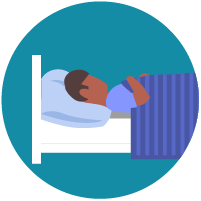
Stay home if you’re sick
- Stay home if you are sick, except to get medical care. Learn what to do if you are sick.

Cover coughs and sneezes
- Cover your mouth and nose with a tissue when you cough or sneeze or use the inside of your elbow.
- Throw used tissues in the trash.
- Immediately wash your hands with soap and water for at least 20 seconds. If soap and water are not readily available, clean your hands with a hand sanitizer that contains at least 60% alcohol.

Wear a facemask

Clean and disinfect
- Clean AND disinfect frequently touched surfaces daily. This includes tables, doorknobs, light switches, countertops, handles, desks, phones, keyboards, toilets, faucets, and sinks.
- If surfaces are dirty, clean them: Use detergent or soap and water prior to disinfection.
To disinfect:
Most common EPA-registered household disinfectants will work. Use disinfectants appropriate for the surface.
Options include:
- Diluting your household bleach.
To make a bleach solution, mix:- 5 tablespoons (1/3rd cup) bleach per gallon of water
OR - 4 teaspoons bleach per quart of water
Follow manufacturer’s instructions for application and proper ventilation. Check to ensure the product is not past its expiration date. Never mix household bleach with ammonia or any other cleanser. Unexpired household bleach will be effective against coronaviruses when properly diluted.
- 5 tablespoons (1/3rd cup) bleach per gallon of water
- Alcohol solutions.
Ensure solution has at least 70% alcohol. - Other common EPA-registered household disinfectants.
Follow the manufacturer’s instructions for all cleaning and disinfection products (e.g., concentration, application method and contact time, etc.).
November is National Diabetes Month, this month communities across the country work together to bring attention to diabetes. This year the focus is on the link between diabetes and cardiovascular disease.
Adults with diabetes are two times more likely to die from heart disease or stroke as someone without diabetes. This is because over time, high blood glucose from diabetes can affect the health of your blood vessels and the nerves that control your heart.
However, you can take steps to manage diabetes. This in turn can also help lower your chances of having heart disease or a stroke:
- Quit smoking or cease the use of other tobacco products.
- Stay on top of your A1C, blood pressure, and cholesterol levels.
- Develop or maintain healthy lifestyle habits, such as, more physical activity, and stress management.
- Take medicines as prescribed by your doctor.
The Ocean County Health Department is pushing back against diabetes as an agency. We are in the process of applying for National Accreditation as a Diabetes Self-Management Education and Support (DSMES) provider. In addition, we currently have two newly certified Lifestyle Change coaches, and are working towards becoming a Diabetes Prevention Program to help improve health behaviors and health outcomes for people with diabetes. Please contact Meg McCarthy-Klein, MS, RDN our Clinical Nutritionist at 732-341-9700 x 7237 or MegMcCarthy@ochd.org if you are interested!
Public Health Week is April 1st through the 7th . Public health workers will continue their work to protect the health and safety of community members. We want all Ocean County residents to live a long and healthy life in a safe environment. During this public health week we will be highlighting the services we provide for individuals to ensure a decrease in the causes of poor health and disease risk among individuals and within our community. The Ocean County Health Department will be facilitating several events to help promote the services that we provide to the public because public health is you too. We will be participating in the Ocean County College Opiate Summit, Sexual Assault Awareness Night at Blue Claws Stadium, and a Live Healthy Ocean County (LHOC!) event at St. Paul Lutheran Church in which we will be partnering with Senior Services.
We have made it a priority to have services from the following units our Alcohol and Drug Services, Chronic Disease Services, Community Assessment and Health Education, Emergency Preparedness, Infectious Disease Services, Environmental Health Services, and our Maternal and Child Health Services.
Learn more on our 2019 National Public Health Week page.
Take the initiative to protect yourself from the measles! Measles is a highly contagious disease caused by exposure to the measles virus. It rapidly spreads through the air when an infected individual coughs or sneezes. The initial symptom of the measles is a fever; infected individuals will then experience a cough, runny nose, and red eyes. A tiny rash of red bumps will appear on the skin, first appearing on the head and working its way down the rest of the body.
Steps to Prevent Measles:
It is important for every child to receive two doses of measles, mumps, and rubella (MMR) vaccination by age six. The CDC considers you protected from measles if you have written documentation (records) showing at least one of the following:
- You received two doses of measles-containing vaccine, and you are a(n)—
- school-aged child (grades K-12)
- adult who will be in a setting that poses a high risk for measles transmission, including students at post-high school education institutions, healthcare personnel, and international travelers.
- You received one dose of measles-containing vaccine, and you are a(n)—
- preschool-aged child
- adult who will not be in a high-risk setting for measles transmission.
- A laboratory confirmed that you had measles at some point in your life.
- A laboratory confirmed that you are immune to measles.
- You were born before 1957.
If you think you have the measles:
Follow these tips immediately at the first sign of symptoms
- Avoid public places or close contact with others.
- Contact your primary care physician immediately to inform them of your signs and symptoms.
- Cover your mouth when you cough or sneeze.
- Stay home for a minimum of four days after you develop a rash
- Practice frequent hand washing.
- Disinfect your surrounding area frequently.
MMR Vaccination:
Take the initiative to get vaccinated! It is important for you to receive a MMR vaccination. Children should get the first dose at 12 through 15 months of age. The second dose should be administered at 4 through 6 years of age. Teens and adults should also be up to date on their MMR vaccination. If you do not have a vaccination record and are unsure of your vaccine history, consult with your primary physician.
Local Considerations:
33 cases of measles have been confirmed in Ocean County as of 12/21/2018. The New Jersey Department of Health issued a press release warning residents about the additional confirmed cases that could have exposed others to the infection while in Ocean County between October 17, 2018 through November 30, 2018. The last rash onset date is November 30, 2018 and 4 days of infection ended on December 4, 2018.
Anyone who visited the following locations may have been exposed to measles:
- CHEMED Health Center, 1771 Madison Ave, Lakewood, NJ 08701
- October 17 between 3:00 p.m. and 6:00 p.m.
- October 18 between 10:45 a.m. and 1:30 p.m.
- October 30 between 9:20 a.m. and 12:30 p.m.
- October 31 between 8:45 a.m. and 1:00 p.m.
- November 1 from 10:15 p.m. to close
- Eat a Pita, 116 Clifton Ave, Lakewood, NJ 08701
- October 15 between 7:00 p.m. and 10:00 p.m.
- Four Corners Bagel & Café, 150 James St, Lakewood, NJ 08701
- October 31 between 12:30 p.m. and 3 p.m.
- NPGS, 231 Main St, Lakewood, NJ 08701
- October 25 between 9 a.m. and 12 p.m.
- October 29 between 2:15 p.m. and 4:45 p.m.
- Office of Dr. Eli Eilenberg, 150 James St, Lakewood, NJ 08701
- October 31 between 11:15 a.m. and 2:45 p.m.
- November 1 between 12:00 p.m. and 4:30 p.m.
- Pizza Plus, 241 4th St, Lakewood, NJ 08701
- October 28 between 12:30 p.m. and 3:30 p.m.
- Schul Satmar, 405 Forest Avenue, Lakewood, NJ 08701
- October 13- October 21 between 1:00 p.m. and 4:00 p.m. daily
- October 28- November 1 between 9:00 a.m. and 2:00 p.m. daily
- October 28- October 31 between 6:30 p.m. and 12:30 a.m. (morning of Nov. 1)
- November 1 between 6:30 p.m. and 10:00 p.m.
- Office of Dr. Eli Eilenberg, 150 James St, Lakewood, NJ 08701
- November 1 between 12:00 p.m. and 4:30 p.m.
- Fountain Ballroom, 725 Vassar Ave, Lakewood, NJ 08701
- October 30-October 31 between 6:00 p.m. and 1:30 a.m.
- Mesivta of Eatontown, 1300 New Hampshire Ave, Lakewood, NJ 08701 and 107 East Harvard St, Lakewood, NJ 08701
- November 6-November 9
- Bais Shalom AKA Alumni, 345 9th St, Lakewood, NJ 08701
- November 6 between 1:15 and 6:45 p.m.
- Motor Vehicle Commission, 1861 Hooper Ave, Toms River, NJ 08753 (The Motor Vehicle Commission has chosen to close this location until Monday, Nov. 19. Other locations will be open for customers in the area).
- November 7 between 2:30 and 5:15 p.m.
- Ateres Reva, 500 Summer Ave, Lakewood, NJ 08701
- November 11 between 6:00 p.m. and 1:00 a.m. (morning of November 12)
- Lake Terrace, 1690 Oak St, Lakewood, NJ 08701
- November 12 between 6:30 p.m. and 2:00 a.m. (morning of November 13)
- Passaic Chill Youth Drop In Center 217 Brook Ave, Passaic, NJ 07055
- November 17 between 8:30 p.m. and midnight
- Junior’s Kosher Deli, 215 Main Ave, Passaic, NJ 07055
- November 18 between 7:30 p.m. and 10 p.m.
- Rite Aid, 78 Main Ave, Passaic, NJ 07055
- November 18 between 8:00 p.m. and 10:30 p.m.
The Ocean County Health Department is working diligently to identify and notify people who might have been exposed during the time the individuals were infectious. In the event that additional exposure locations are identified, information will be updated on the New Jersey Department of Health’s measles page.
Additional Resources:
https://www.state.nj.us/health/cd/topics/measles.shtml
https://www.state.nj.us/health/cd/documents/topics/measles/measles_exposure_guidance_public.pdf
https://www.state.nj.us/health/cd/topics/measles.shtml
Learn more on our Communicable Disease page.
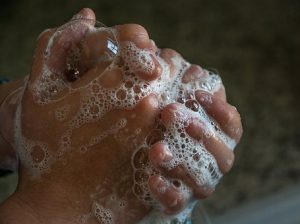
Take the initiative to protect yourself from seasonal influenza this season. Influenza (Flu) is a virus that is a contagious respiratory virus. It is important for everyone 6 months of age and older to get vaccinated each year. There are also a few more steps you can take to prevent the seasonal flu.
Steps to prevent the flu:
- Wash your hands- it is important to wash your hands frequently throughout the day.
- Avoid close contact- steer clear of family and friends when they are sick to avoid catching their germs.
- Cover your nose and mouth- Whenever you cough or sneeze, be sure to cover your mouth with your elbow to avoid the spread of germs.
- Avoid touching your face- Keep your hands off of your eyes, nose, and mouth. These areas are portals for germs to enter your body.
- Stay home when you’re sick- Avoid contact with co-workers, family, and friends when you are sick to avoid spreading your germs.
- Know when to seek medical treatment- It is important to monitor your signs and symptoms. If you have flu-like symptoms you may want to see your primary physician for anti-viral medications.
If you are sick with the flu:
Some people may only experience mild symptoms of the flu. However, sometimes the illness is more severe and leads to complications. Follow these tips to help yourself recover faster when sick with the flu.
- Get plenty of rest- Sleep restores your body’s immune system. Avoid strenuous activity and added stress.
- Drink fluids- Dehydration is common when sick. Providing your body with enough fluids can lessen your chance of dehydration. Drink plenty of water and sports drinks will to stay hydrated.
- Stay home- The influenza virus is highly contagious. It is important to take off work and school when you are sick so you don’t spread the virus.
- Avoid close contact- The influenza virus may spread quickly to those you are in close contact with. Distance yourself from family and friends during the time that you are sick.
Flu vaccines:
Take the initiative to get vaccinated! It is important for you to receive a flu vaccination every year. Vaccines provide your body with the immunity and protection against influenza viruses. There are many convenient locations you can go to get your flu shot.
- Your primary care physician
- The Ocean County Health Department offers vaccines at various locations throughout Ocean County. For a schedule of upcoming flu clinics in Ocean County, click HERE or call Clinic Services at (732) 341- 9700, Ext. 7604
- Many pharmacies now offer flu shots. For local participating pharmacies, click HERE
Additional resource:


